Does Listening to Classical Music Increase IQ?
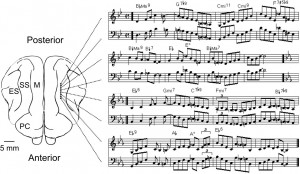 I get this question a lot. It goes back to the craze around the Mozart Effect or the idea you can get smart by listening to Mozart’s music. As far as I can tell there is no (or little) scientific evidence to support the idea. There is some evidence however that listening may temporarily (10-15 min) improve your spatial reasoning skills.
I get this question a lot. It goes back to the craze around the Mozart Effect or the idea you can get smart by listening to Mozart’s music. As far as I can tell there is no (or little) scientific evidence to support the idea. There is some evidence however that listening may temporarily (10-15 min) improve your spatial reasoning skills.
More relevant for readers of the next Brain Blog is the growing evidence that learning to play a musical instrument can improve many cognitive skills and perhaps raise IQ. Scans reveal musician’s brains look different and they tend to score higher on standardized tests for spatial-temporal tasks, verbal memory and even math. One study suggested a small increase in IQ of children taking music lessons.
As learning to play a musical instrument brings intrinsic satisfaction, it may be a particularly good option for building YourNextBrain! Interested to hear from reader with brain boosting experiences related to learning an instrument.
Source: Image of brain and sheet music
Categories: Child, IQ and EQ, Memory and Learning, Music and Audio, Training Tags: Mozart Effect
Is Your Next Brain in Fact Your Heart?
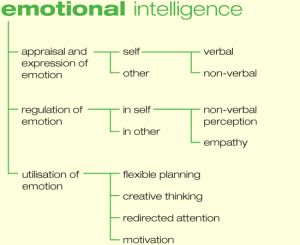 Daniel Goleman popularized the notion of Emotional Intelligence in 1995 in his best selling book by the same name. The idea is that a lot of what counts as smarts comes from our ability to perceive and manage emotions in ourselves and others. This is the foundation for self control and healthy relationships and leads to a successful life. The focus on emotional thinking versus rational or logical thinking as a key to intelligence was a huge paradigm shift that is still unfolding today.
Daniel Goleman popularized the notion of Emotional Intelligence in 1995 in his best selling book by the same name. The idea is that a lot of what counts as smarts comes from our ability to perceive and manage emotions in ourselves and others. This is the foundation for self control and healthy relationships and leads to a successful life. The focus on emotional thinking versus rational or logical thinking as a key to intelligence was a huge paradigm shift that is still unfolding today.
There is no doubt that understanding and manging emotions is a key for improving learning, decision-making, creativity, collaboration and other cognitive skills. Emotional intelligence will be a frequent topic on the Next Brain Blog. In an earlier post I provided links to quick and in-depth surveys that let you measure your emotional quotient (EQ) or level of emotional intelligence. In this post we will start to examine techniques for improving it.
For a quick introduction to how to develop your EQ check out the HELPGUIDE’s post on Five Key Skills for Building Emotional Intelligence. Although there are literally thousands of websites, books and other resources for learning about EQ I like this site. It demonstrates that emotional intelligence is rooted in common-sense life skills such as quickly reducing stress and managing your own feelings. No rocket science but the fact is that we often don’t take the time to develop specific skills to do these kinds of things and that impedes our cognitive performance.
Check the site out and please comment on the specific techniques you use to develop EQ.
Source: Emotional Intelligence Image
Mental Practice Makes Perfect
Playing things out in your mind before you actually do them is a great way to improve performance in many different types of tasks. Mental practice or rehearsing is a technique that is taught to athletes, managers, high-performance sales people and many other professionals. How to improve you skill in mental practice will be a frequent topic on the Next Brain Blog.
For a quick introduction check out Head Games: An Introduction to Mental Rehearsal by Dr. Scott Williams a Professor of Management and Director of the Center for Innovation at Wright State University.
He offers this nine-step procedure for doing mental practice (and I quote):
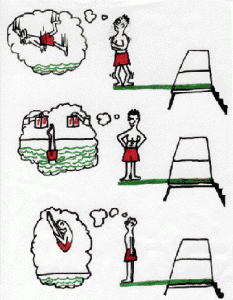 “Find a time and place where you won’t be interrupted.
“Find a time and place where you won’t be interrupted.- Recline or lie down, and close your eyes.
- Relax, concentrate, and focus. Take deep breaths and exhale slowly. As you exhale, imagine that stress is leaving your body. Start at your feet … feel all the stress leave your feet … then your legs … then your chest … all the way to the top of your head … feel all the stress leave your body. Free your mind of distractions and allow your mind to focus on the relaxation process.
- Once relaxed, focus on the specific challenging task.
- Mentally tell yourself that you are confident and that you have the ability to perform this task successfully. Repeatedly tell yourself, with confidence, that you will be successful.
- Imagine what you will see just before you begin the task. Visualize yourself as an active participant, not as a passive observer. For example, to mentally rehearse putting a golf ball, imagine that you are standing on the green rather than watching yourself from the gallery.
- Remaining relaxed and focused, mentally rehearse successful performance of this task. Imagine going through the process and seeing successful results.
- Repeat step 7 several times.
- Finally, open your eyes and smile. You have successfully performed in your mind, which is great preparation for actual performance. You should now be confident that you will perform successfully in the real situation. Remember to praise yourself for being successful. Self-reinforcement is another a key to self-motivation.”
Try this out on a task or performance you have coming up in the next couple of days. Does it work? Leave a comment and share your experience and results.
Source: Image of Diver
Categories: Memory and Learning, Training Tags: brain training, sports
Food Combinations Sharpen Mental Focus
One technique for improving your brain and mind is tuning your diet. There have been many studies making claims about how certain nutrients impact cognitive performance. Dietary techniques – eating specific foods, food combinations, avoiding foods and the use of supplements – will be a frequent topic on the Next Brain blog.
 For example, check-out this AARP-endorsed 3-minute video outlining tips for eating in a brain smart way. Here is the basic claim:
For example, check-out this AARP-endorsed 3-minute video outlining tips for eating in a brain smart way. Here is the basic claim:
“Want to be more mentally alert? The right fruit and vegetable combinations can help you think more clearly —especially if those combos are raw, with their nutrients intact, says AARP health and fitness ambassador Martina Navratilova in this video.”
I like this video because it offers simple but clinically supported ideas for making simple substitutions in your diet. For example, snacking on pumpkin seeds and using dark leafy vegetables in your salad. Making significant dietary changes is hard. We have a much better chance with simple additions or substitutions.
Categories: Diet, Mental Focus Tags: fruit
Want a High Performance Mind?
Combat soldiers, surgeons, ER professionals, Olympic athletes and others that face extreme-stress situations involving judgement must all develop high performance minds to be successful. Cognitive performance in extreme circumstances has been studied closely and training programs and techniques have been developed and tested. How to use these techniques to build a high performance mind will be a frequent topic on the Next Brain Blog.
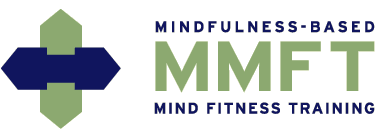 For example, The Mind Fitness Training Institute, is in the news for a program they have for training the minds of US combat soldiers. They just completed a pilot study that demonstrated how mindfulness training techniques can improve working memory and affective response (or emotional control).
For example, The Mind Fitness Training Institute, is in the news for a program they have for training the minds of US combat soldiers. They just completed a pilot study that demonstrated how mindfulness training techniques can improve working memory and affective response (or emotional control).
Soldiers in the program start by mastering attentional control and concentration using a mindfulness training technique. A briefing document explains:
“At first, exercises emphasize building concentration by focusing on one object of attention, such as the breath, contact between the body and the floor or chair, or sensations within specific body parts. This single focus of attention is maintained throughout a practice session; when attention wanders, it is returned to the object of attention. Later in the course, exercises require attending to body sensations during movement and “shuttling” the attention between inner sensations andouter experiences (i.e., sights or sounds).”
This technique is used in many other programs that promise to build a high performance mind. An important finding because it tells us:
The first step in developing a high performance mind is to practice attentional control and concentration using a very simple training technique.
And you don’t need to have an extreme-stress job or attend a special training program to get started. Here is what you do:
- Rest comfortably by laying down or sitting
- Close your eyes if you want to
- Focus on your stomach and feel your breathing
- Pay attention to all your bodily sensations in your belly as move through the complete breathing cycle of inhaling and exhaling
- If you mind wanders to another topic or sensation return your attention to your belly and the cycle of breath.
Your only task here is to bring your mind back to the sensation of breathing every time it wonders. Sounds simple but it takes practice. And what you are learning is invaluable – how to control your own mind!
15 minutes per day for a week should produce a noticeable result. At the very least you will have first hand experience in attempting to control you attention in a systematic way. If you try it and please share your experience by leaving a comment.
Categories: Ancient Ways, Manage Emotions, Mental Focus, Training Tags: meditation, mindfulness
How Your Mind Improves With Age
 We have been taught that our minds decline with age. We become more forgetful, find it harder to learn, cannot focus as intensely, loose our creative powers and cannot master new technical specialties. Our brain cells die off, new connections don’t form and our brains shrink. A dark picture of increasing cognitive decline.
We have been taught that our minds decline with age. We become more forgetful, find it harder to learn, cannot focus as intensely, loose our creative powers and cannot master new technical specialties. Our brain cells die off, new connections don’t form and our brains shrink. A dark picture of increasing cognitive decline.
Fortunately, a growing number of studies show that some of these ideas are false and that we actually improve in certain aspects of cognitive performance as we age. We keep most of our brain cells and can form major new connections through something called neuroplasticity much later into life than previously thought. We develop greater abilities in drawing conclusions from examples, making judgement, seeing the meaning of situations and many other aspects of mental functioning.
In a recent blog post, Barbara Strauch, deputy science editor and health and medical science editor at The New York Times writes:
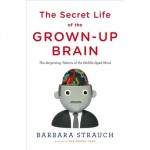 “Over the past few years, neuroscientists have begun to zero in on the brain’s changes in middle age, and what they’ve found is encouraging. Results of long-term studies show that — contrary to stereotypes — we actually grow smarter in key areas in middle age which, with longer life spans, now stretches from our mid 40s to our mid to late 60s.”
“Over the past few years, neuroscientists have begun to zero in on the brain’s changes in middle age, and what they’ve found is encouraging. Results of long-term studies show that — contrary to stereotypes — we actually grow smarter in key areas in middle age which, with longer life spans, now stretches from our mid 40s to our mid to late 60s.”
She expands on this point in her fourth coming book, The Surprising Talents of the Middle-Aged Mind.
The importance of this type of research for improving our minds and brains is significant. Why?
The assumptions we make about our own cognitive abilities strongly determines how well we perform.
For example, assuming you are forgetful, less creative, unable to master a second language or that math is impossible to learn all lower cognitive performance. Changing self-limiting assumptions about our own minds and the social stereotypes about aging brains mentioned above will take a long time. But it is a powerful means for improving cognitive performance and will be a frequent topic on the Next Brain Blog.
Source: Image of Older Adult
Categories: Books, Cognitive Decline, IQ and EQ, Older Adult Tags:
Use Your Body to Improve Thinking Instantly!
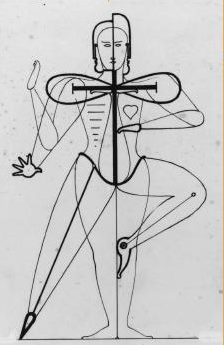 Over the last 20 years scientists have made good progress in understanding how our bodies impact the way we learn, think, solve problems manage emotions and do other mental tasks. A new view has emerged called embodied cognition that argues how our minds work is strongly determined by how our bodies interact with the world.
Over the last 20 years scientists have made good progress in understanding how our bodies impact the way we learn, think, solve problems manage emotions and do other mental tasks. A new view has emerged called embodied cognition that argues how our minds work is strongly determined by how our bodies interact with the world.
Embodied cognition has practical implications for improving cognitive performance and will be a frequent topic on the Next Brain Blog. For example, taking simple actions such as literally stepping back when faced with a tough problem or more complex actions such as taking a walk lead to better results.
This is an exciting result because it shows a very simple actions can immediately improve the performance of our minds and brains!
Talking and thinking with our hands, how we sit or hold our arms (body posture) and any sort of short-duration physical activity have all be shown to improve various aspects of thinking, problem solving and learning.
Take for example the 2007 study that was recently blogged about as, Unravel Problems by Folding Your Arms, in Psychology Today. The idea that folding your arms could in fact help you solve hard problems may seem a bit simplistic but there is some neuroscience behind it:
“Crossing our arms, Friedman and Elliot argued, sends our a brains a “proprioceptive cue.” “Proprioception” is the scientific term for our perception of the relative position of our body parts. When our arms are crossed it tells the brain to buckle down and get ready to work through a difficult problem. So next time you’re faced with a protracted project or a tough task, cross your arms to see it to a speedy, successful conclusion. Just remember, while our brains perceive crossed arms as a sign of perseverance, others may perceive it as a sign of boredom. Body language can mean many different things to different people in different situations-it’s part of what makes the field so exciting!”
If you are still skeptical watch the highly effective problem solvers around you. What do they do with their bodies when they are stumped?
Source: Image adapted from Moving Bodies.
Categories: Lifestyle, Memory and Learning, Problem Solving Tags: embodied cognition
Sharpen the Senses to Accelerate the Mind
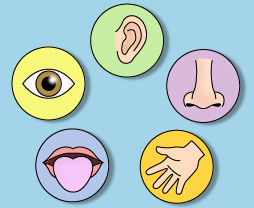 Being observant or attuned to the sounds, sights, smells, tastes and tactile feelings about you is a set of skills that can be learned. The more aware we are the richer our experiences and the more effective our brains and minds will be. Said another way, if we don’t hear, see, smell, taste or feel something it is hard to remember, think about, learn from or use it to solve a problem.
Being observant or attuned to the sounds, sights, smells, tastes and tactile feelings about you is a set of skills that can be learned. The more aware we are the richer our experiences and the more effective our brains and minds will be. Said another way, if we don’t hear, see, smell, taste or feel something it is hard to remember, think about, learn from or use it to solve a problem.
Small improvements in observational skills can lead to a big jump in cognitive performance.
Given this, developing skills to sharpen our senses will be a frequent topic on the Next Brain Blog.
But how do we go about improving our ability to perceive the world? There is no how-to manual. Fortunately, the art of perception is taught in many disciplines. For example, supercharging your skills of visual perception is taught in drawing and law enforcement classes. How to hear is taught in music appreciation. There are many lessons we can draw from these disciplines that will help us sharpen our senses in everyday settings.
Take for example the techniques for visual observation that are taught to security and law enforcement personnel. This blog post summarizes one such technique nicely:
“When you set out to develop your observation skills, there’s a simple exercise that you can do to help. When you encounter a person while in a public place, in the time that you are with that person, see what you can observe about him or her. Catalogue the person’s height, weight, build, hair color, eye color, clothing and any distinguishing marks as though you will have to describe the person to the police afterwards. Notice important and telling details like whether the person is wearing a wedding ring. Also notice the person’s body language, facial expressions and eye movements, see what hypothesis you can form about their emotional state. Be careful not to stare while you’re observing all of these things, you don’t want to come off as creepy. If you feel comfortable, engage the conversation and see which of your estimates were on the mark. Once you feel comfortable with this exercise, up the ante and see if you can observe 2, 3 or 4 people at once. As you go through these exercises, you’ll notice that your ability to observe will increase tremendously.”
You can do this yourself. If you try it or use a different technique for sharpening your senses leave a comment and share your experiences.
Source: Five Senses Image
Categories: Perception Tags:
Morning Pages will Boost Your Creativity
 Individual creativity or the mental ability to generate new and relevant ideas on-demand is a highly prized skill. Although creativity is not fully understood there are many proven techniques we can use to improve it. Creativity will be a frequent topic on the Next Brain Blog.
Individual creativity or the mental ability to generate new and relevant ideas on-demand is a highly prized skill. Although creativity is not fully understood there are many proven techniques we can use to improve it. Creativity will be a frequent topic on the Next Brain Blog.
A great way to get started in developing your creativity is to work through a self-paced program such as The Artist’s Way. A primary technique the book teaches is called the Morning Pages.
“Morning Pages are three pages of longhand, stream of consciousness writing, done first thing in the morning. There is no wrong way to do Morning Pages– they are not high art. They are about anything and everything that crosses your mind– and they are for your eyes only.”
Doing this teaches your brain how to flow, initially without any specific purpose. But it is the first step. Much like “just start running” would be a first step in training for a foot race.
Doing Morning Pages for at least three months should produce a noticeable change in your capacity to think creativity.
For more detail on the Morning Pages and a second technique check out Basic Tools. This is a 16-page 8.5M PDF file.
If you have been using Morning Pages or other writing-based creativity techniques please leave a comment and share your experiences and results.
Categories: Books, Problem Solving, Training Tags: creativity
Can 3 Minutes of Yoga Daily Improve Your Brain?
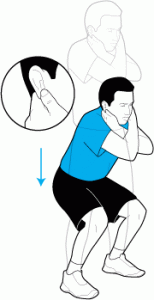 Doing Yoga can change how your brain functions. Yoga as a worldview, exercise routine and even a lifestyle offers important options for improving the performance of our minds and brains. The mind-enhancing effects of Yoga will be a regular topic on the Next Brain Blog.
Doing Yoga can change how your brain functions. Yoga as a worldview, exercise routine and even a lifestyle offers important options for improving the performance of our minds and brains. The mind-enhancing effects of Yoga will be a regular topic on the Next Brain Blog.
A simple Yoga exercise has been in the news lately. It involves holding your earlobes, placing your tongue on the roof of your mouth and rhythmically breathing while doing deep knee bends. Sounds a bit strange but it does not take long. According to many reports from teachers, doctors, therapists and scientists it produces results such as improved self-control, more mental energy and increased intelligence.
Check out this CBS news report for an introduction to the technique and what people are experiencing.
The news report mentions confirming EEG studies but I have not been able to locate those. I did find this post that offers this explanation:
“There is a lot of research to support that simple exercises like a breathing squat can improve function, focus and efficiency in the brain. Activation of specific acupressure points from the earlobes during the squat exercise stimulates the brain on the opposite side. Do the breathing squat exercise 21 times with the tongue touching the roof of the mouth. Exhale while squatting and inhale while standing up. Perform this movement with a 555 tempo. 5 seconds down-hold for 5 -5 seconds up. This simple exercise will activate chemicals in the brain, create synchronicity of the hemispheres, activate the pineal gland for awakeness and activate the pressure points of the ear lobes. The combination of crossing the midline, as well as stimulating the pressure points creates a perfect storm of electrical brain activity that stimulates neuropathways and can literally make you think better.”
If you want to give it a try be sure you are fit enough to do deep knee beds. You can find very clear directions on exactly what to do on eHow. If you do try it out please post a comment and share your results and experience.
Source: Exercise Image
Categories: Ancient Ways, IQ and EQ, Mental Focus, Training Tags: Yoga
